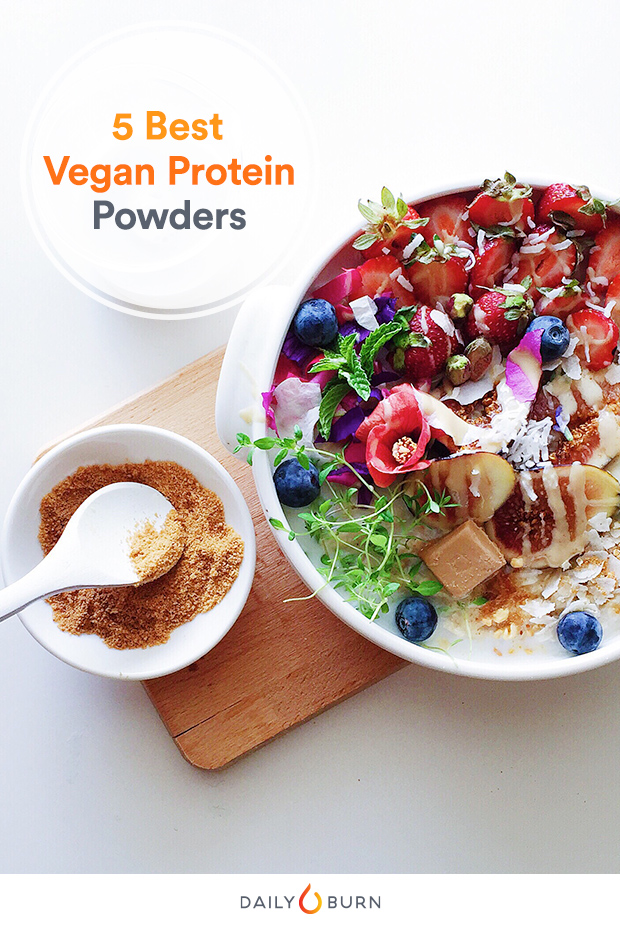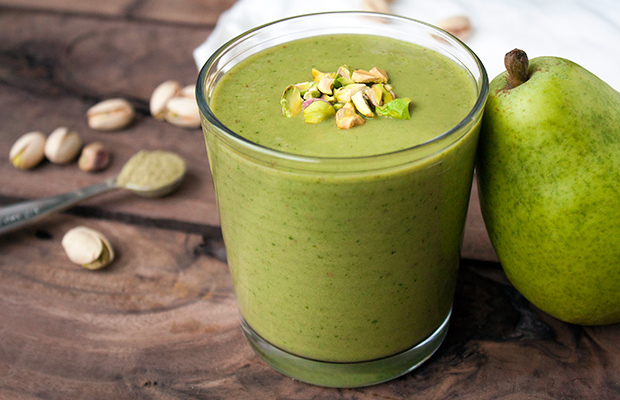
You’d think that adding protein powder to your meals would help simplify your nutritional needs. Unfortunately, the world of supplements and protein powders can be a confusing place to navigate. From whey to casein and egg white protein powders, there are countless protein powder blends — many of which are made with added sugar and other processed ingredients. And if you’re a vegetarian or vegan, it can be even more challenging to find a plant-based protein powder that checks every box on your nutritional wish list.
So first, some need-to-know info: Most protein powders you find in stores are a blend of vegetable and grain protein sources (brown rice protein and pea protein, for example), but you’ll also find ones that are pure hemp or spirulina. Keep in mind that these powders are often mixed with cocoa powder, sugar or Stevia for flavor. You might even find that some powders include adaptogens, like maca and reishi, or antioxidant fruit blends with a variety of vegetables and fruits.
RELATED: How to Choose the Best Protein Powder for You
The Truth About Complete Proteins
McKel Hill, MS, RD, founder of the Nutrition Stripped blog, says, “The key with plant-based protein powders is to find one that has a nice combination of several sources to ensure a higher amino acid profile.”
While foods like quinoa are complete proteins in their whole form, they’re not in their powder form, so that’s why you’ll find it combined with other protein sources. According to Erin Palinski-Wade, RD, CDE, author of Belly Fat Diet for Dummies, “Plant-based protein powders will offer a good source of protein, but most will not be considered a complete protein since they may be lacking a few essential amino acids.”
That said, there’s still value in adding more aminos to your diet. These key nutrients help prevent fatigue and help reduce protein and muscle breakdown during an intense workout. Plus, “Our bodies can do an amazing job of pulling together amino acids to create proteins. It’s more important to get enough in the span of your day and week. Combining foods to create ‘complete proteins’ is a thing of the past,” Hill says.
Sarah Snyder, Daily Burn Nutrition Coach, says to remember that protein powders are purely supplemental and should not replace whole foods. In addition to protein, Snyder recommends finding a powder that also has a good source of fats and carbohydrates.
RELATED: How to Choose the Best Protein Powder for You
One Scoop, Two Scoop
In addition to the nutritional profile, you want to keep the taste, quality and cost in mind; protein powders can be expensive. But above all else, you should take a close look at the ingredient list. Hill recommends opting for organic plant-based proteins, since you’re more likely to find purer ingredients. Avoiding artificial sweeteners is also a good call, Snyder says, since they can cause sugar cravings to kick into high gear.
Like all nutritional choices: The best one for you will come down to your goals. If it’s to lose weight, for instance, Palinski-Wade recommends a low-calorie, plant-based protein, like pea powder. If you’re looking to improve your heart health, then hemp powder, which is an excellent source of omega-3 fatty acids, may work better for you. Or, search for a blend of two or more different vegan protein powders to cover all your bases with one scoop.
To help you get started, here are a few of the most common types of vegan protein powders, and the best ways to use them.
RELATED: 21 Protein Powder Recipes for Chocolate Lovers

5 Vegan Protein Powders to Supplement Your Diet
1. Spirulina
It’s easy being green when you’ve got spirulina. Just one scoop can give you similar nutrients you’d find in a one big green salad. The superfood blue-green microalgae is a cousin of seaweed and kelp and is packed with plant-based protein, B vitamins, iron, beta carotene, selenium and vitamin E. Many vegetarians and vegans also rely on spirulina to get vitamin B12, which is usually found in animal sources of protein. Nora Minno, RD, CDN, Daily Burn Fitness/Nutrition Coach, says, “Vitamin B12 is an important water soluble vitamin that aides in energy production, DNA synthesis and central nervous system functioning. It’s hard to find plant-based sources, so spirulina would be a great choice for vegetarians and vegans.”
Despite spirulina’s stellar nutritional profile, it still only has four grams of protein per tablespoon, so you’ll need to supplement it with other food sources, like beans, nuts and seeds, quinoa, tempeh and whole grains. Also keep in mind it has an intense earthy taste, but if you add it to smoothies, energy balls or homemade bread, you can easily mask the flavor.
2. Pea Protein
If you’ve hit up a Juice Press or Juice Generation recently, you might have noticed pea protein pop up on the menu. That’s because this buzzy ingredient is a 100 percent plant-based protein source, and it actually has a great amino acid profile because it is also high in lysine, a branch chain amino acid that plays an important role in muscle repair, says Minno. It’s also a good option for people with allergies because it’s gluten-free, soy-free and dairy-free, Palinski-Wade says.
“Pea protein is becoming more popular because lots of athletes are turning to plant-based proteins, especially in light of studies linking excess casein intake to cancer cell proliferation,” Minno says. Plus, there are approximately eight grams of protein per scoop, and it’s easy on the tummy (bye bye bloating from whey products). The bonus is that it has a neutral taste and doesn’t feel chalky like other protein powders on the market.
RELATED: 10 Delicious Protein Pancake Recipes
3. Hemp Protein
We know what you’re thinking, but the only high you’ll be getting from hemp protein powder is the feeling of fullness — mostly from the “good” fat. Hemp protein powder is made from hemp seeds, a derivative of cannabis. But unlike marijuana, hemp protein has very little THC so you won’t feel the side effects. In addition to protein and magnesium, hemp seeds are a great source of omega-3 and omega-6 fatty acids. Just one tablespoon of hemp seeds has 5.3 grams of protein, but you might even find some powders have 10 grams.
For those who are trying to lose weight, be wary of its high-fat content, Palinski-Wade says. Like pea protein, hemp protein is 100 percent plant-based and is easy to digest. Hemp protein has a nutty, mild flavor; it can be a little earthy, too. But it makes a great addition to delicious energy bars so you can keep hunger at bay.
4. Quinoa Protein
Quinoa is one of the few plant-based foods that’s considered a complete protein. You’ll find that quinoa protein powder is mostly sold in combination with a vegetable protein powder blend and not on its own as a protein isolate. A scoop of a vegetable protein powder blend with quinoa can range anywhere from 15 to 22 grams per serving. “If you’re looking for a protein powder that’s a little purer, something with quinoa is a good option because it doesn’t contain arsenic, which protein powder from brown rice might have,” Snyder says. It’s also a good source of iron, zinc, magnesium and folate.
You can cut the costs of buying quinoa protein powder by making your own. Ground quinoa in a coffee grinder, high-speed blender or food processor. The powder can even work as a healthy substitute for white flour in baking recipes or in breakfast pancakes, egg scrambles, smoothies, homemade truffle balls and granola.
RELATED: From Maca to Reishi: What You Need to Know About Adaptogens
5. Garbanzo Bean Protein
Chickpeas are a great addition to vegetarian and vegan diets — and can take on various forms. For one, there’s aquafaba, the thick liquid you find in canned chickpeas. Also known as chickpea water, aquafaba can be used as a substitute for egg whites in vegan dishes. And then there’s garbanzo bean protein powder, which provides a vegan and vegetarian source of protein, iron and fiber. With 10 grams of protein per half-cup, Palinski-Wade says chickpea flour has a favorable impact on cholesterol levels if you need to keep them in check.
Vegan Protein Recipes to Step Your Game Up
Looking for ways to enjoy vegan protein powder? Consider these: Chewy Superfood Hemp Protein Bars, Peanut Butter + Coconut Protein Bites, Orange Kale Protein Green Juice and Quinoa Protein Porridge. And there are many more creative uses for protein powder. You can try it as a delicious coating for chicken, roasted pork or grilled steaks. Or, mix it in as a thickener is soups and sauces. You can also use it as a binder for making patties or meatballs. Vegan living just got a whole lot tastier.
